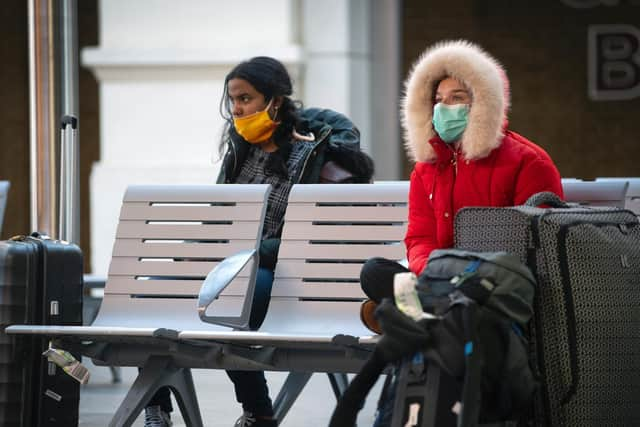Why we must improve pay for workers who keep us safe during the pandemic - Greg Wright
A month into the lockdown, many of us must feel like old hands when it comes to maintaining social distance under pressure.
But the pandemic should also lead to a fundamental re-assessment of the nature of work. It has shown that society would collapse without workers we normally take for granted.
Advertisement
Hide AdAdvertisement
Hide AdThe supermarket staff who man the tills, stock shelves and drive delivery vans are a case in point.


Debbie Robinson, the chief executive of Central England Co-op, which has hired 1,000 staff to help keep its stores open and installed 1,000 safety screens, believes the pandemic will lead to a shift in attitudes.
She said: “One of the biggest things will be the change in public perception for our frontline colleagues.
“These are people who, in the past, might not have been recognised for the vital role they play in society. These uncertain times have now shown everyone how important they are in making sure everyone has access to food and essentials.”
Advertisement
Hide AdAdvertisement
Hide AdSuddenly, staff who protect the things we value the most - food and the wellbeing of our loved ones - are being praised by politicians and applauded by the public. Some of them are making the ultimate sacrifice for the greater good.
It’s hardly surprising that unions are demanding a proper pay rise for all the staff who are keeping vital local services running, including schools, refuse collection and child protection services.
UNISON’s head of local government Jon Richards said: “While many are at home, council staff are going above and beyond keeping vital local services running.
“Some are facing huge risks as they go about their work. The least the Government can do is to reward them with a proper pay rise and ensure all those that need protective equipment to help keep them safe have access to it now.”
Advertisement
Hide AdAdvertisement
Hide AdA report from the think tank the Resolution Foundation - which can be found at www.resolutionfoundation.org/ - questions what will happen to care workers, who are on the frontline in the fight to contain the pandemic, when life finally returns to normal.
The report said: “For decades it has been said that those who care for the vulnerable are overlooked and underpaid.
“More recently, already poor workforce conditions have been squeezed further due to a combination of rising demand for care from our ageing population, and a sustained squeeze on public funding.”
There are around 900,000 people working in frontline care roles in the UK as their main job.
Advertisement
Hide AdAdvertisement
Hide AdThe Resolution Foundation found that the care sector has a predominantly female workforce - 83 per cent of frontline care workers are women - with disproportionate BAME representation, and it includes many who have caring responsibilities of their own. One-in-seven are single parents.
The report concluded that frontline care workers are underpaid, with around half earning less than the real Living Wage. They are particularly vulnerable to being paid below the legal wage floor and experience significant job insecurity. They are four times more likely than average to be employed on a zero-hours contract.
So how can we protect these workers? As the Resolution Foundation acknowledges, some changes are long-term and complex – not least a long-awaited overhaul of the funding system for social care in England.
The report added: “ Others, like ensuring care workers receive a decent wage in the here and now, are not technically especially challenging.”
Advertisement
Hide AdAdvertisement
Hide AdThe pandemic has proved that the lowest paid workers carry out the most important roles during a time of crisis. Their wellbeing should not be placed in jeopardy by a lack of protective equipment or inadequate pay.
It is not enough to applaud from the sidelines. As taxpayers and voters, we must demand that politicians act now to improve their basic pay and conditions, otherwise their superhuman efforts will have been in vain.
Editor’s note: first and foremost - and rarely have I written down these words with more sincerity - I hope this finds you well.
Almost certainly you are here because you value the quality and the integrity of the journalism produced by The Yorkshire Post’s journalists - almost all of which live alongside you in Yorkshire, spending the wages they earn with Yorkshire businesses - who last year took this title to the industry watchdog’s Most Trusted Newspaper in Britain accolade.
Advertisement
Hide AdAdvertisement
Hide AdAnd that is why I must make an urgent request of you: as advertising revenue declines, your support becomes evermore crucial to the maintenance of the journalistic standards expected of The Yorkshire Post. If you can, safely, please buy a paper or take up a subscription. We want to continue to make you proud of Yorkshire’s National Newspaper but we are going to need your help.
Postal subscription copies can be ordered by calling 0330 4030066 or by emailing [email protected]. Vouchers, to be exchanged at retail sales outlets - our newsagents need you, too - can be subscribed to by contacting subscriptions on 0330 1235950 or by visiting www.localsubsplus.co.uk where you should select The Yorkshire Post from the list of titles available.
If you want to help right now, download our tablet app from the App / Play Stores. Every contribution you make helps to provide this county with the best regional journalism in the country.
Sincerely. Thank you.
James Mitchinson
Editor